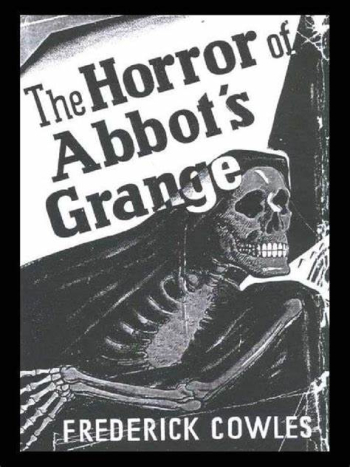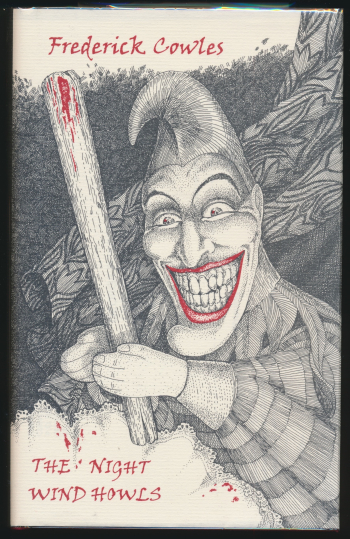I've spent the last week searching out horror stories by Frederick Cowles. I saw his name mentioned in a Facebook post and decided to give him a try. The more I learned about his work, the more interested I became. Frederick Ignatius Cowles (1940-1947) was a librarian who wrote travelogues, folklore and children's stories. The most famous book he ever wrote was This is England (1946). In his spare time, he wrote horror stories, having been heavily inspired by M.R. James. In his lifetime, he only published two volumes of horror stories and wrote about 60 tales before he passed away.
 Despite being inspired by M.R. James, his work has its share of distinctions. James liked to fill his work with antiquarian lore and delivered his horrors with a subtle blow. While Cowles did not lack subtlety, his work has more bite than James and of many of his contemporaries. There is an uncompromising brutality in his work, although you couldn't say his work was explicit. Much like James, his ghosts are of a tangible variety, but they tend to be more repulsive, pungent either with decay or disease. For my money, I actually like Cowles better than James, with his work being more forthright. You have to be in a certain mood for James while Cowles' books are most likely the type I would pick up anytime.
Despite being inspired by M.R. James, his work has its share of distinctions. James liked to fill his work with antiquarian lore and delivered his horrors with a subtle blow. While Cowles did not lack subtlety, his work has more bite than James and of many of his contemporaries. There is an uncompromising brutality in his work, although you couldn't say his work was explicit. Much like James, his ghosts are of a tangible variety, but they tend to be more repulsive, pungent either with decay or disease. For my money, I actually like Cowles better than James, with his work being more forthright. You have to be in a certain mood for James while Cowles' books are most likely the type I would pick up anytime.
Generally, the only way you can obtain Cowles' work for any affordable price is to buy the e-books or listen to the short stories on YouTube, his original editions commanding prices in the thousands while his books reprinted by Ash-Tree costs hundreds (you'll probably never see me review anything by them because even their books have prices that resemble my gas bill during winter.) If you're lucky, you might find his work in an anthology, such as those edited by Hugh Lamb. There are three collections of Cowles' stories, (one of them published after he died): The Horror of Abbot's Grange, Fear Walks the Night, and the Night Wind Howls.
I haven't read all of Cowles' horror work, but I plan to. I mostly dipped into stories from The Horror of Abbot's Grange, the original cover of the book almost embodies everything I love about early 20th century horror. No gloss, no pretense, just the simple macabre touch of a cloaked skeleton. I'll give a brief synopsis of the stories I've read while they're still fresh in my mind.
"The Horror at Abbot's Grange" is about a couple that purchases an ancient house in the English countryside that was owned by a wicked lord, the full horror of the lord's power is revealed at a housewarming party. This has become a favorite for me as far as vampire fiction is concerned.
"The Headless Leper" tells of a young man's experience with a leprous apparition while "One Side Only" recounts the story of a traveler who meets a deformed ghost on a moor.
"Passenger from Crewe tells about a strange companion that a man meets on a train and of the brief, grisly tale that the stranger recounts.
The House on the Marsh" is about a young man, who's newly inherited home is infested with flies and of the ghost of his uncle, who was a serial-killing sorcerer.
"Eyes for the Blind" is a tale about a spiritual medium possessed by the ghost of a necromancer, who used to hoard the eyes of children.
Aside from these stories, I read a couple others that are collected in The Vampire Archives, edited by Otto Penzler (probably the largest anthology of vampire stories in print). The first is Cowles' most anthologized story "The Vampire of Kaldenstein," a well-told, but somewhat conventional story of a man traveling in Europe who encounters a vampire count. The other, "Princess of Darkness" mixes a little foreign diplomacy in a story in which a man falls into the clutches of Hungarian vampiress.
I've read thousands of horror stories in short form, and I have to say that Cowles generally produced satisfying work, giving the feel detached English manner in his narrative structure and voice, but took no prisoners when it comes to delivering the horror. Instead of comparing to him to M.R. James, I would rather think that the feel of his work is more like A.M. Burrage, another lesser-known English ghost story writer, who had a tendency to dive into brooding atmosphere and macabre apparitions without James' antiquarian touches. You should check out all three of them, but I have to admit that I'm really taken with Cowles and hope to own physical copies of his books someday.
Written by Nicholas Montelongo
 Despite being inspired by M.R. James, his work has its share of distinctions. James liked to fill his work with antiquarian lore and delivered his horrors with a subtle blow. While Cowles did not lack subtlety, his work has more bite than James and of many of his contemporaries. There is an uncompromising brutality in his work, although you couldn't say his work was explicit. Much like James, his ghosts are of a tangible variety, but they tend to be more repulsive, pungent either with decay or disease. For my money, I actually like Cowles better than James, with his work being more forthright. You have to be in a certain mood for James while Cowles' books are most likely the type I would pick up anytime.
Despite being inspired by M.R. James, his work has its share of distinctions. James liked to fill his work with antiquarian lore and delivered his horrors with a subtle blow. While Cowles did not lack subtlety, his work has more bite than James and of many of his contemporaries. There is an uncompromising brutality in his work, although you couldn't say his work was explicit. Much like James, his ghosts are of a tangible variety, but they tend to be more repulsive, pungent either with decay or disease. For my money, I actually like Cowles better than James, with his work being more forthright. You have to be in a certain mood for James while Cowles' books are most likely the type I would pick up anytime.Generally, the only way you can obtain Cowles' work for any affordable price is to buy the e-books or listen to the short stories on YouTube, his original editions commanding prices in the thousands while his books reprinted by Ash-Tree costs hundreds (you'll probably never see me review anything by them because even their books have prices that resemble my gas bill during winter.) If you're lucky, you might find his work in an anthology, such as those edited by Hugh Lamb. There are three collections of Cowles' stories, (one of them published after he died): The Horror of Abbot's Grange, Fear Walks the Night, and the Night Wind Howls.
I haven't read all of Cowles' horror work, but I plan to. I mostly dipped into stories from The Horror of Abbot's Grange, the original cover of the book almost embodies everything I love about early 20th century horror. No gloss, no pretense, just the simple macabre touch of a cloaked skeleton. I'll give a brief synopsis of the stories I've read while they're still fresh in my mind.
"The Horror at Abbot's Grange" is about a couple that purchases an ancient house in the English countryside that was owned by a wicked lord, the full horror of the lord's power is revealed at a housewarming party. This has become a favorite for me as far as vampire fiction is concerned.
"The Headless Leper" tells of a young man's experience with a leprous apparition while "One Side Only" recounts the story of a traveler who meets a deformed ghost on a moor.
"Passenger from Crewe tells about a strange companion that a man meets on a train and of the brief, grisly tale that the stranger recounts.
The House on the Marsh" is about a young man, who's newly inherited home is infested with flies and of the ghost of his uncle, who was a serial-killing sorcerer.
"Eyes for the Blind" is a tale about a spiritual medium possessed by the ghost of a necromancer, who used to hoard the eyes of children.

Aside from these stories, I read a couple others that are collected in The Vampire Archives, edited by Otto Penzler (probably the largest anthology of vampire stories in print). The first is Cowles' most anthologized story "The Vampire of Kaldenstein," a well-told, but somewhat conventional story of a man traveling in Europe who encounters a vampire count. The other, "Princess of Darkness" mixes a little foreign diplomacy in a story in which a man falls into the clutches of Hungarian vampiress.
I've read thousands of horror stories in short form, and I have to say that Cowles generally produced satisfying work, giving the feel detached English manner in his narrative structure and voice, but took no prisoners when it comes to delivering the horror. Instead of comparing to him to M.R. James, I would rather think that the feel of his work is more like A.M. Burrage, another lesser-known English ghost story writer, who had a tendency to dive into brooding atmosphere and macabre apparitions without James' antiquarian touches. You should check out all three of them, but I have to admit that I'm really taken with Cowles and hope to own physical copies of his books someday.
Written by Nicholas Montelongo
The author does not allow comments to this entry
No comments